Bare metal hosting is a physical server dedicated to a single tenant/customer. Each server offered for rental is a distinct physical piece of hardware that is a functional server.
Despite seeing the rise of bare metal servers in recent years, as a category, they are not new and have been commercially available since the early 2010s. Some vendors’ offerings tout both the high-performance benefits of a physical server and the multi-tenancy benefits of virtualization.
Despite being often used interchangeably, the terms ‘bare metal server’ and ‘dedicated server’ refer to different types of servers. As such, it’s worth asking yourself: bare-metal vs dedicated servers: which is the better hosting option? before making a decision.
With all that in mind, here are the best bare metal hosting providers currently on the market.
We’ve listed the best cheap dedicated server deals.
Why you can trust TechRadar
We spend hours testing every product or service we review, so you can be sure you’re buying the best. Find out more about how we test.
Best overall
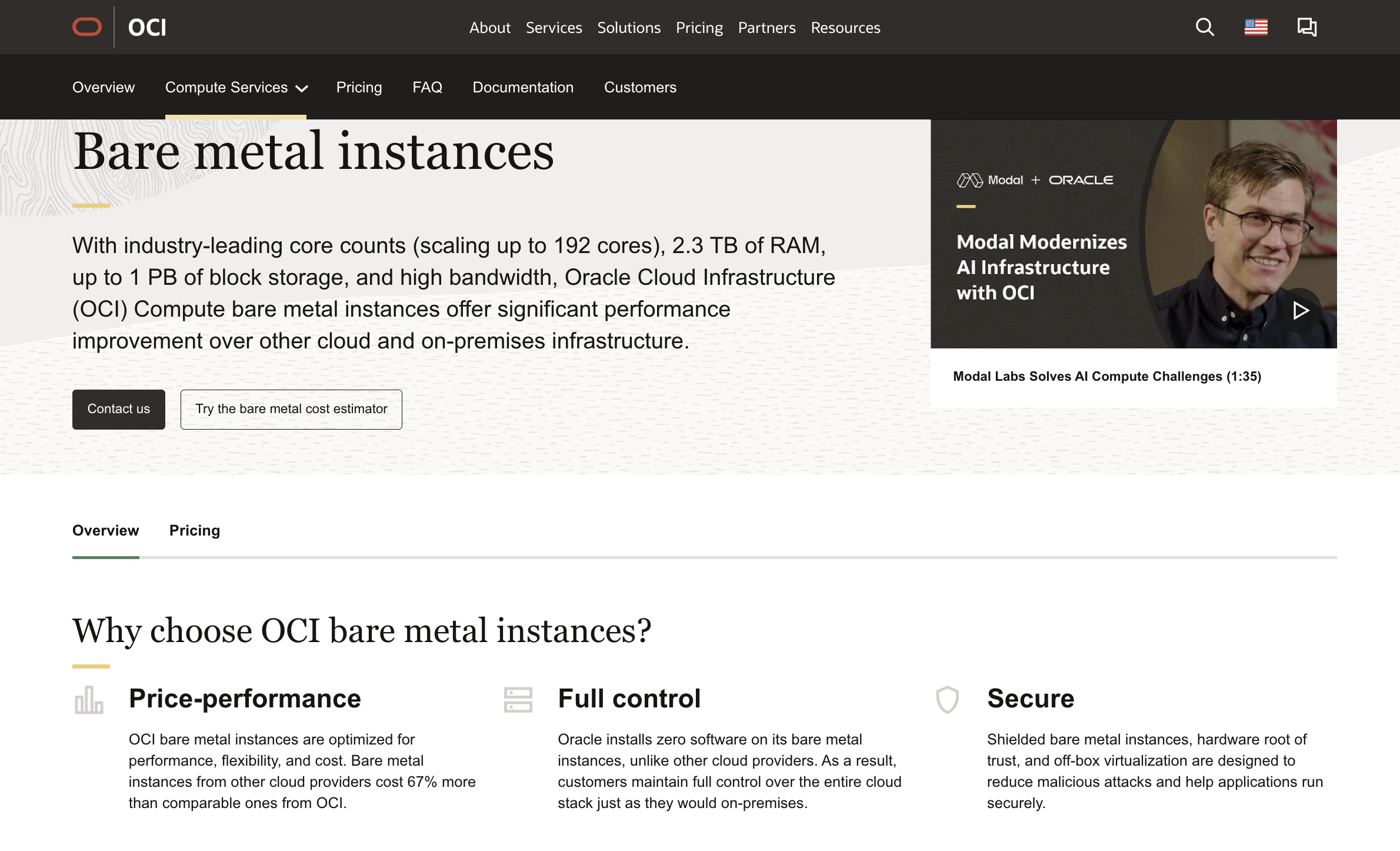
If you need a highly tailored bare-metal server configuration that caters to specific workloads, Oracle’s Bare Metal Instances could be for you. Options include a ‘Standard’ instance configuration for standard purpose workloads, which balances CPU cores, memory and network resources to suit a range of applications and use cases.
‘HighIO’, for performance-intensive database workloads with high IOPS requirements, offers local NVMe-based SSDs and delivers fast random I/O and high IOPs.
For big data workloads, there is ‘DenseIO’, and ‘HPC Instance’ is Oracle’s most powerful config designed for massively parallel HPC (or high-performance computing) workloads.
These bare metal servers offer support for applications with intensive needs and can scale up to a whopping 192 cores (the most we’ve seen anywhere), 2.3TB of RAM, and 1PB of block storage. You can also select the processor you want — AMD, Intel, or Ampere.
For pricing you can check their cost estimator tool or simply scroll through various options. Like the AMD-based instances start from $0.0015/unit per hour.
Best for AWS
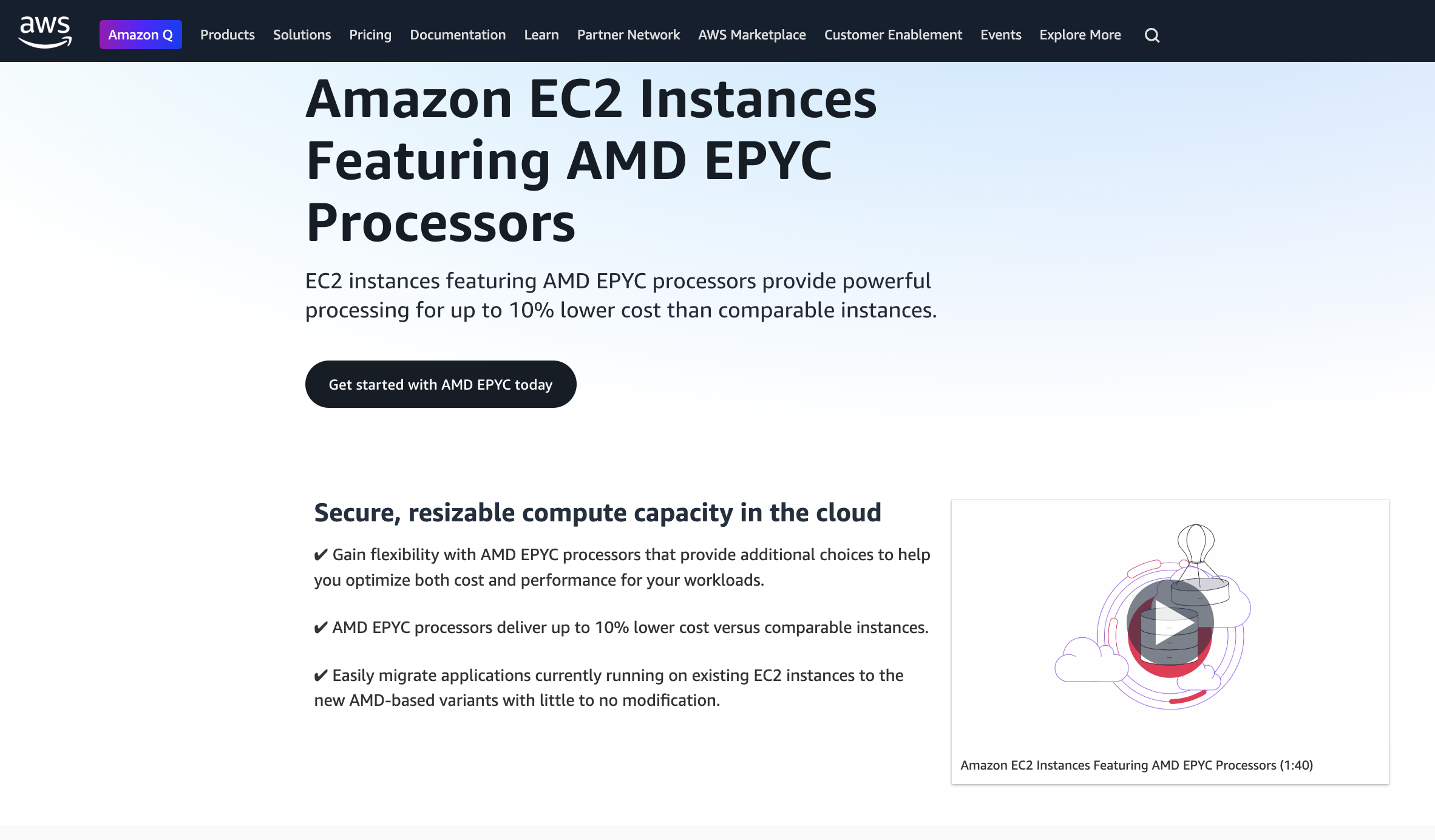
Amazon’s EC2 (Elastic Compute Cloud) is a technology which allows you to create and manage computing resources in the cloud.
Although EC2 instances are often virtual servers, Amazon now offers many bare metal options. These are often a better choice for demanding workloads like video encoding, scientific modelling, deep learning inference, multiplayer gaming: anything which needs to avoid being slowed down by virtualization, or needs direct access to physical resources and low-level hardware features.
Avoiding virtualization doesn’t mean you have to ignore other AWS services, though, and your Amazon instance can take full advantage of Elastic Load Balancing, Auto Scaling, Amazon CloudWatch, and any other AWS features you might need.
Amazon’s free tier includes the use of an EC2 instance for a generous 750 hours a month for a year. That’s a virtual setup, not bare metal, but it’s still useful as a way to try out Amazon’s management features and learn how the service works.
Alternatively, if you’re ready to jump in right now, low compute costs and hourly billing makes Amazon a very economical solution for many common tasks.
Best for instant setup
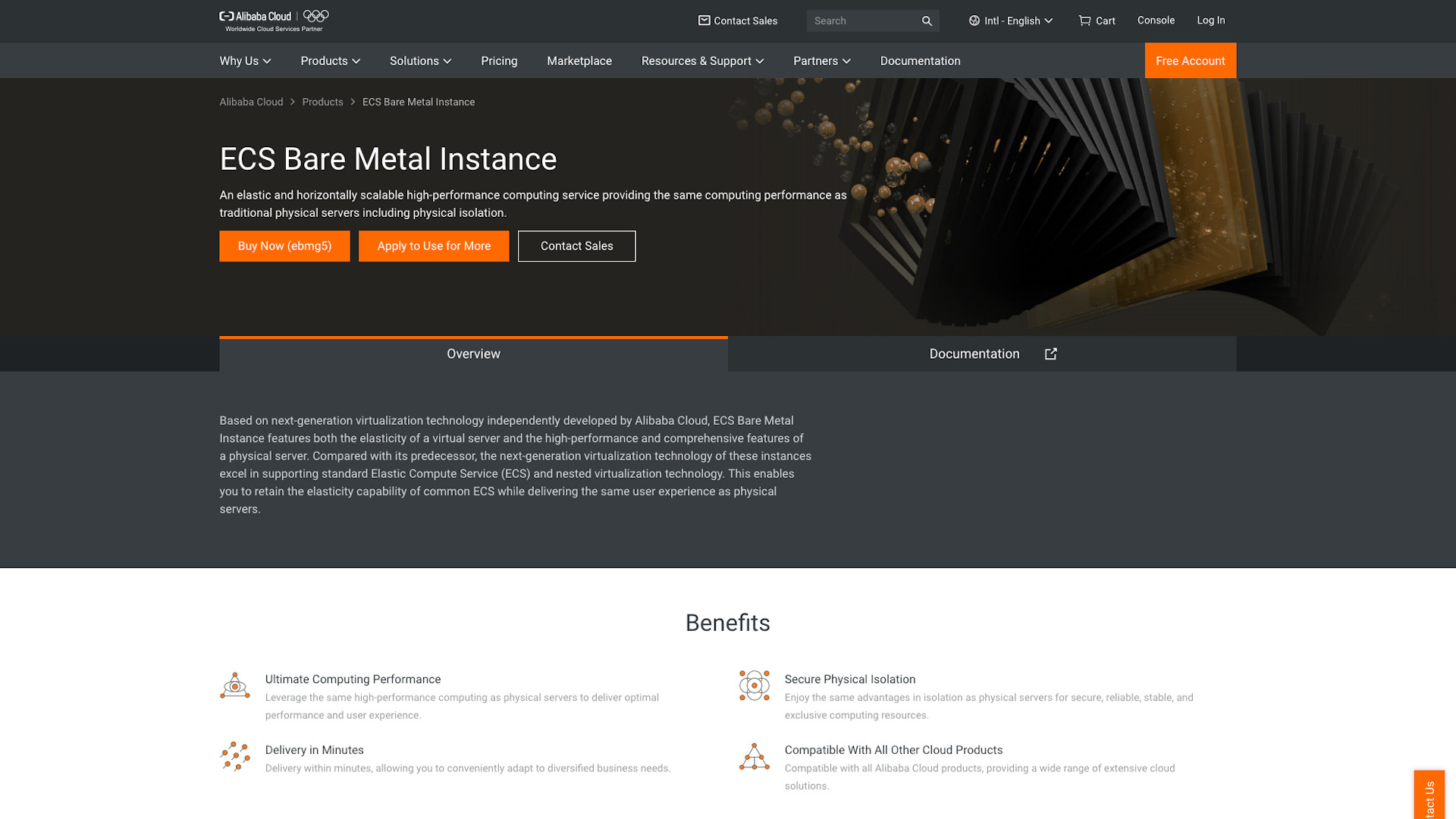
Based on the company’s next-generation virtualization technology, Alibaba’s ECS Bare Metal Instance offers both the elasticity benefits of virtualization and the performance advantages of physical servers. Compatible with all Alibaba Cloud products, ECS Bare Metal Instance supports CPU configurations of between eight and 96 cores, in addition to instance memory expansion from 32GB to 768 GB.
Storage configurations start from virtual server images or cloud disks and support the mounting of multiple cloud disks for better storage capability. It is all protected by Alibaba’s stringent security requirements, so you will not need to worry about your data’s welfare.
They’ve also upgraded their support in recent times with 1-on-1 presale consultations from experienced cloud experts. You also get 24/7 technical support with extended service hours, faster response times, and six free support tickets per quarter.
You also get instant access to hundreds of add-ons, like VPN, Gateway, DNS, and ECS, among others.
Best for UK
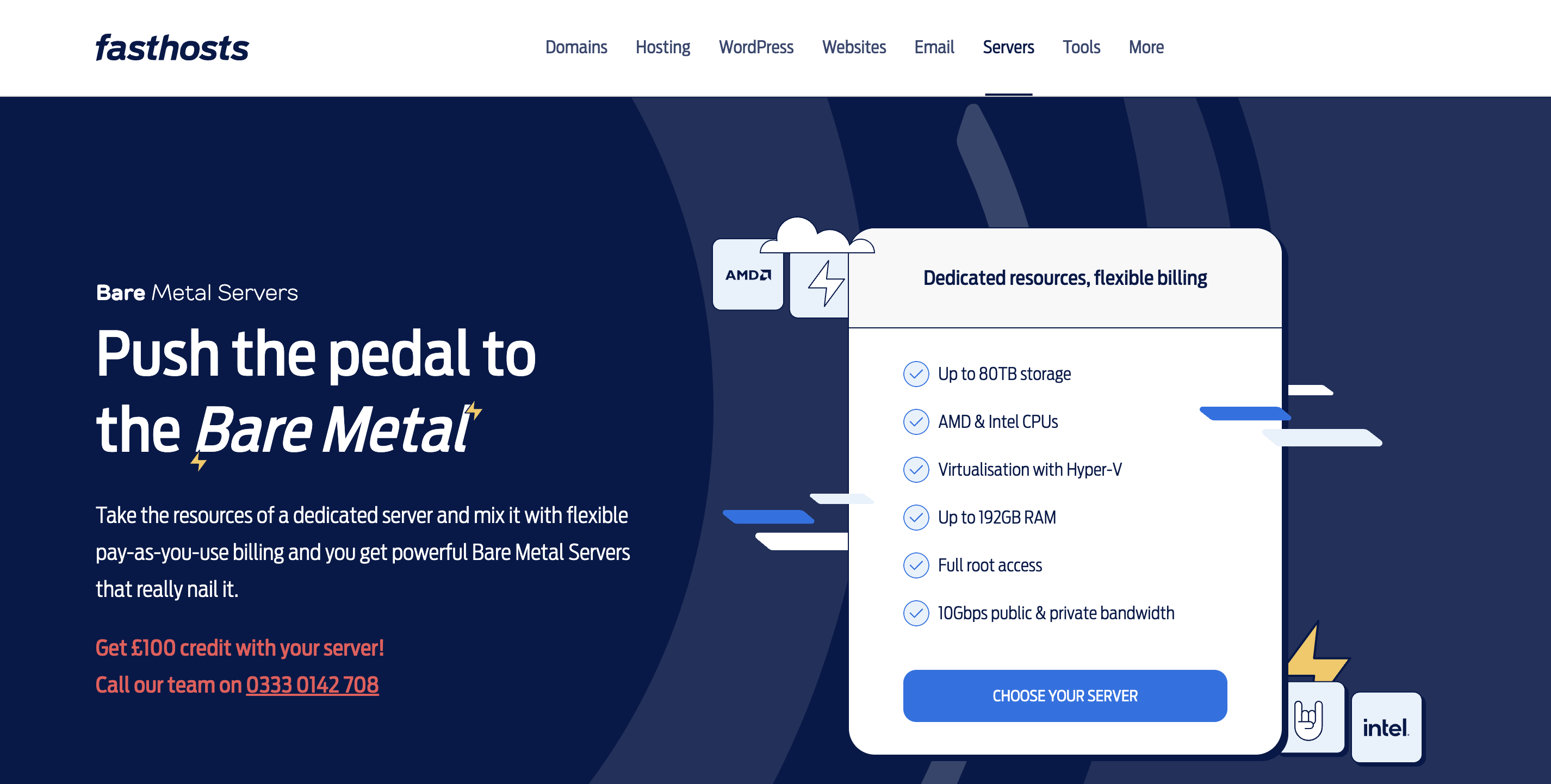
For companies that want access to data centers and support based in the UK, Fasthosts Bare Metal Servers will let you run projects on single-tenant servers with dedicated resources, purchased by the hour or month with pay-as-you-go billing.
In terms of storage, you can choose between a hard disk for high capacity; SSD (for fast storage); or NVMe for speedy and capacious storage. You can choose up to 18 core processors, up to 80TB storage, and 192GB RAM and select either AMD or Intel processors.
Servers can be spun up in minutes, and they feature integrated load balancing for spreading resources around server infrastructure to optimize performance. Based on the location of your visitors, you can pick where to host your server and deliver an optimized experience (UK, US, Germany, and Spain). You can also choose from a wide range of popular operating systems (Windows and Linux).
Their plans start from £40/month and go up to £720/month. You can even pay per hour, with plans starting from £0.055/hour and going up to £1.200/hour.
Best for Europe
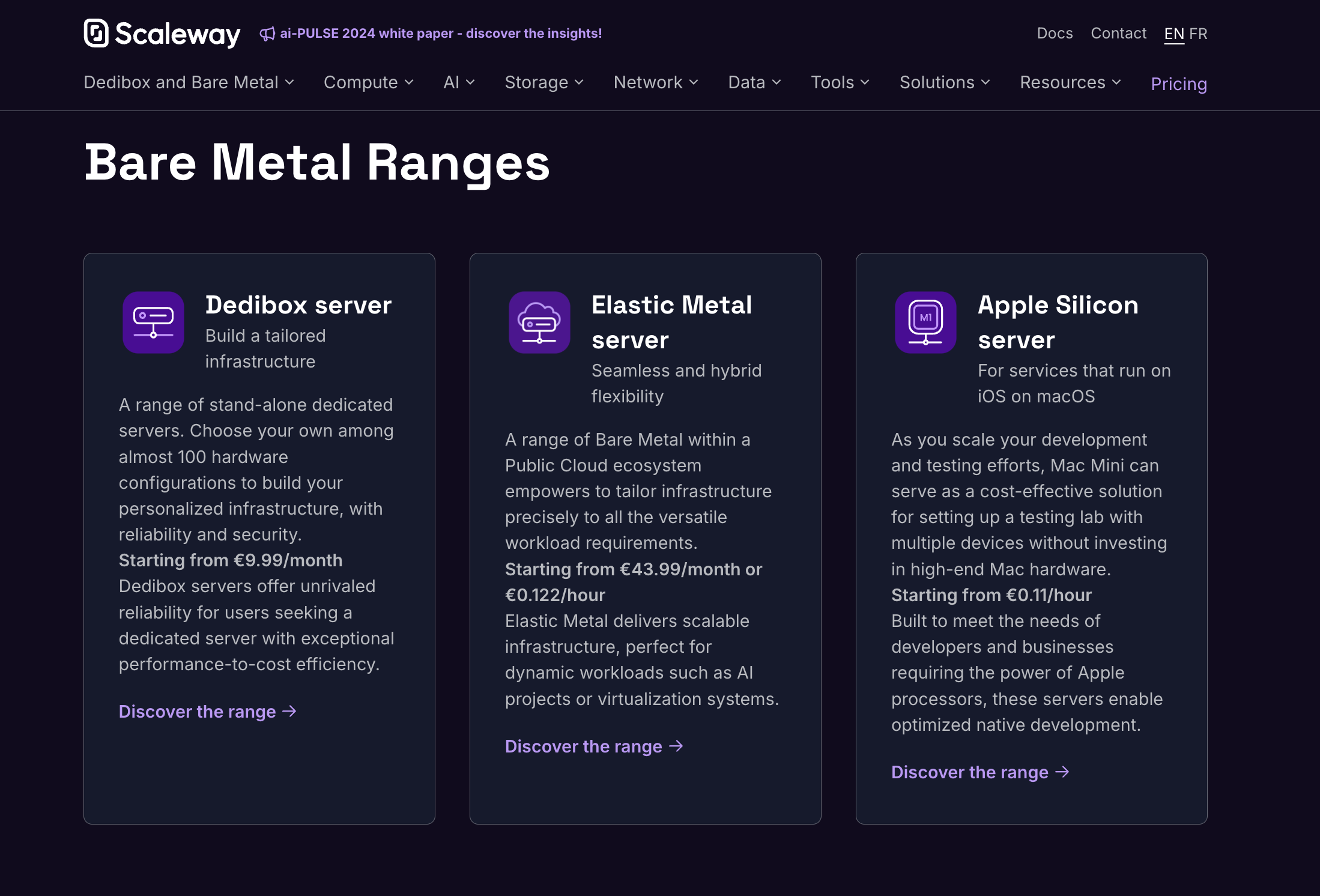
Scaleway Elements Bare Metal Cloud Servers offers hardware configurations based on Intel Xeon or AMD EPYC CPUs that are available in Ubuntu, Debian, CentOS and other Linux variants.
Deployable in a snap, configurations include General Purpose (balancing CPU, RAM and Disks for production environments); High CPU (boosted with CPU for big data applications); and High Memory (boosted with memory for virtualization or RAM-demanding applications).
They offer a slew of features that include remote booting from an ISO file, and the ability to manage servers via Scaleway Console or an API (to automate the creation, installation, reboot or deletion of services).
Hosted in France, Scaleway’s hardware has been expertly designed and tested under extreme conditions in climatic rooms. Users will enjoy complete integration with Scaleway’s cloud ecosystem, and the hosting provider also offers 24/7 technical support.
Plans with no commitment start from €8.99/month, but you can avail a small discount with the Annual as well as the 36 Months plan.
Best affordable
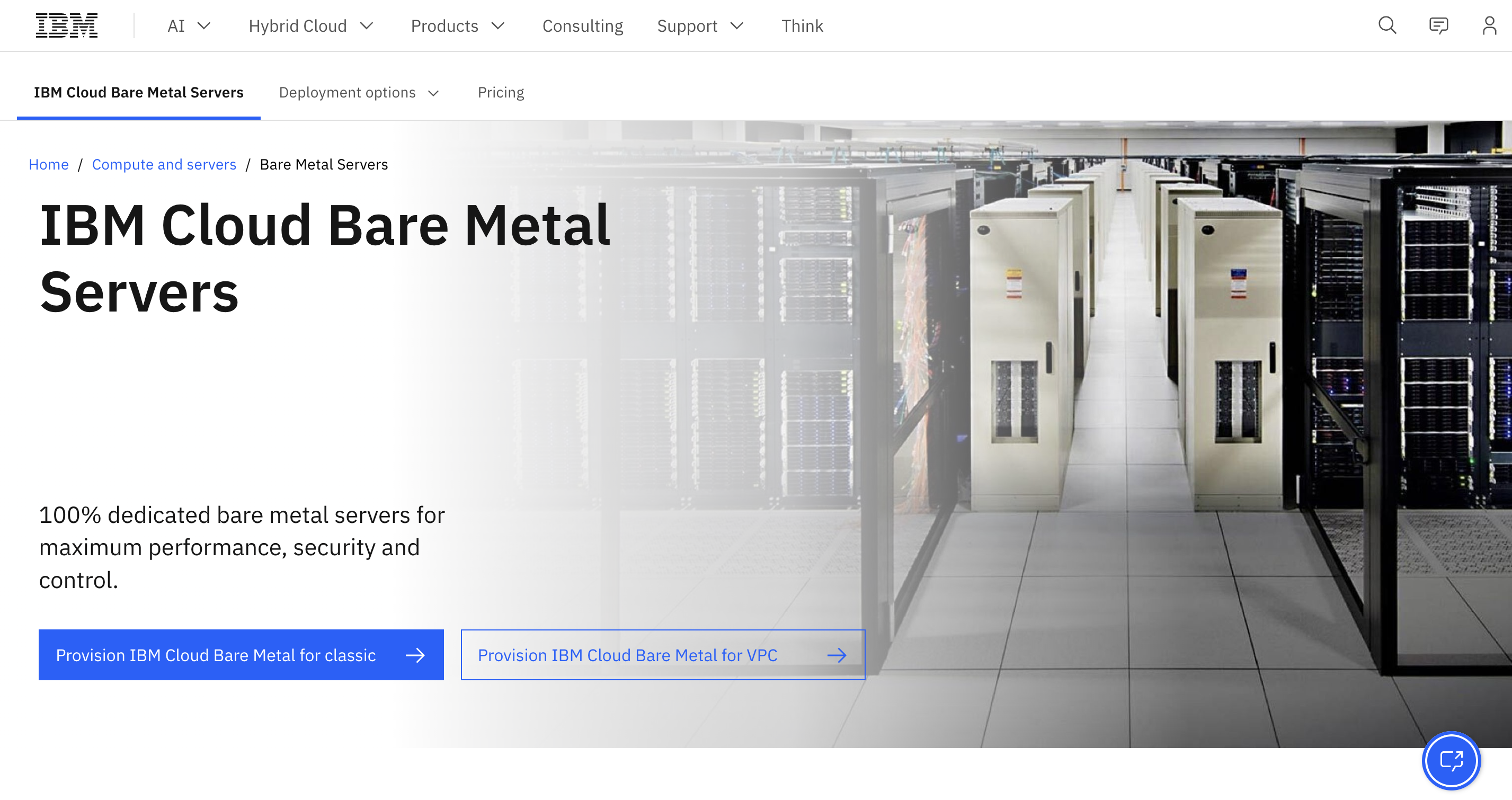
IBM positions its Cloud Bare Metal Servers offering as a more affordable alternative to AWS in many cloud computing scenarios. The company acquired SoftLayer and its bare-metal server capabilities back in 2013, and now runs more than 60 IBM Cloud data centers across 19 countries.
Its bare-metal servers can be customized to meet workload needs, with more than 11 million configurations available that can be paid for hourly, monthly, or through reserved capacity pricing. Plus, you also get 20 TB of bandwidth. IBM lets you choose next-generation CPU technology from Intel® Xeon®, and AMD EPYC™, and add the latest Nvidia GPUs, in addition to 1-, 2-, or 4-core Intel CPUs, to chew through heavy workloads. The setup is easy, there’s great tech support, and the network is fast.
Users can choose their CPU technology from Intel, AMD, and NVIDIA. The storage can be expanded massively — 36 x 12 TB HDDs (432 TB) or 24 x 7.6 TB SSDs (182 TB) and up to 36 drivers per server.
Best for DDoS protection
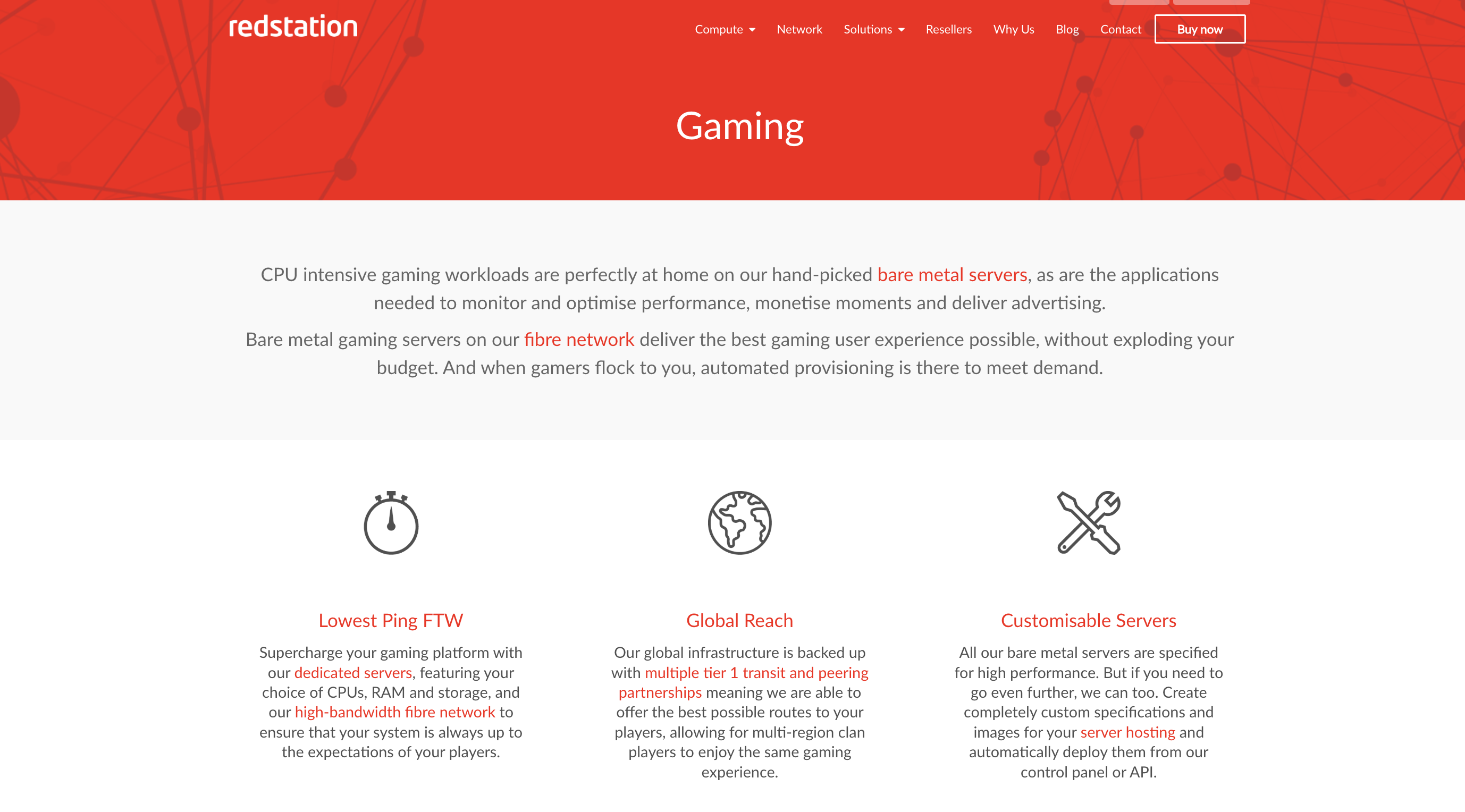
Redstation’s bare metal servers benefit from multiple tier 1 transit and peering partnerships, meaning they are configured to give gamers the lowest pings even if they’re located across the other side of the world from their teammates.
The company’s fiber network offers unlimited bandwidth and is suitable for hosting applications needed to monitor and optimize performance, monetize moments and deliver advertising. Redstation’s servers operate in a DDoS-free environment, so you won’t have to worry about your gaming customers falling victim to a DDoS attack mid-session.
Redstation servers come with a pre-built library of operating systems, making them easy to use. Although there’s no live chat support or knowledge base, the servers are fully customizable, and there is a 100% power and network guarantee. Note that the uptime guarantee doesn’t factor in planned maintenance and upgrades.
Their prices range from the bargain chassis from £22 to a full rack that are around £1,681.68.
Read our full Redstation review
Best for control
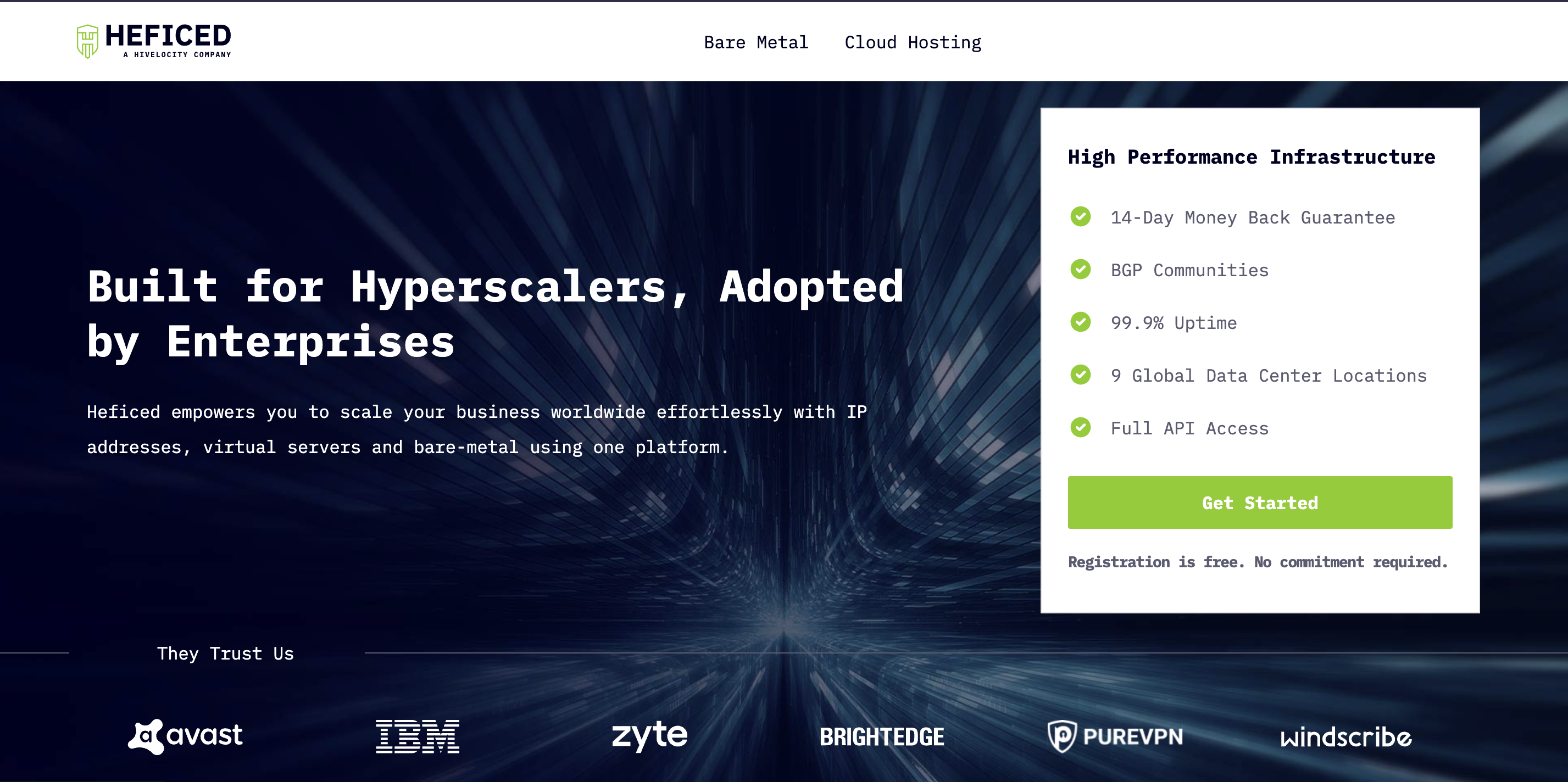
HEFICED’s bare-metal servers promise high performance, robust security, and are available with a high level of customization. Used by companies such as IBM, Avast and PureVPN, the company’s servers are located in ISO-certified, state-of-the-art Tier 3 data facilities which feature power and cooling redundancy to ensure maximum uptime and enterprise-grade infrastructure for mission-critical applications.
HEFICED currently has 9 data centers located in Milan, Lagos, Frankfurt, Johannesburg, São Paulo, London and multiple other locations in North America.
They also come equipped with Intelligence Platform Management Interface (IPMI) to ensure easy remote access and monitoring – and you get access to in-house tech support who are responsive and can solve infrastructure-related issues onsite without delay.
HEFICED gives you incredible control over your server, but it is suitable for intermediate and advanced developers, and it doesn’t come with a straightforward installer.
You can also avail up to 62% discounts for dedicated servers, which start from $49/month.
Best bare metal hosting FAQs
What is a bare metal server?
A bare metal server is a physical server that gives dedicated resources to a single tenant. It doesn’t use virtualization and gives you complete access to physical CPUs, storage drives, and memory.
Such servers give a very high performance to a user as there’s no resource-sharing or overhead from hypervisors. Plus, it’s highly secure because of its isolated environment from others. These bare metal servers are ideal for hosting huge databases, gaming servers, and most enterprise applications.
What is the difference between bare metal and cloud?
Both bare metal and cloud-based servers are very different in many ways. For starters, bare metal servers are allotted to a single tenant with complete resource access. Cloud servers on the contrary offer shared resources through virtualization.
In terms of performance, bare metals are way ahead of cloud servers as they don’t have any virtualization overhead and are optimal for latency-sensitive workloads. However, cloud-based servers are ideal if you want easier management with pre-built tools and automation. In fact, cloud servers offers better flexibility and seamless usage for dynamic and less resource-intensive workloads.
What is bare metal in AWS?
AWS offers Bare Metal Instances along with its EC2 (Elastic Compute Cloud) service. Such instances offer dedicated physical servers without any hypervisor. You get full control over your server including both root access and the option to run custom hypervisors.
In short, if you need direct access to certain hardware like high-performance computing, machine learning, and big data analytics, the EC2 is a solid choice for you.
What are the downsides to bare metal hosting?
Bare metal hosting can be comparatively expensive for you as they have a fixed pricing structure. Plus, you might face certain delays in scaling as you’ll have to manually provision additional servers.
If you’re a non tech-savvy person, this hosting might give you some headaches as it has no built-in tools for load balancing, monitoring, or backup. And, unlike cloud, you’ll need to keep a tight check on such hostings as any physical hardware failure needs manual interventions and can lead to downtime.
How to choose the best bare metal hosting for you?
To select the best bare metal hosting for you, you’ll want to first assess your workload needs, estimated traffic, and geographic region of the traffic. You’ll want to consider the technical requirements, like the number of CPU cores and the amount of RAM, storage, and bandwidth you need for your workload to run smoothly.
You’ll also want to check how configurable the hosting plan is, the speed of deployment, the OS support, and the pricing plans, among other things.
The best bare metal hosting: How we test
We’ve compared these bare metal hosting providers across multiple factors, from their technical specifications and customizability to the locations of their data centers and the quality of their server infrastructure. We looked at their security features, pricing plans, and overall performance, among other aspects such as speed of deployment and customizations available.
We checked what type of workloads they could run, their security features, the quality of the facilities the servers are located in, and the ease of signing up and purchasing the service.
Read how we test, rate, and review products on TechRadar
Get in touch
- You’ve reached the end of the page. Jump back up to the top ^
